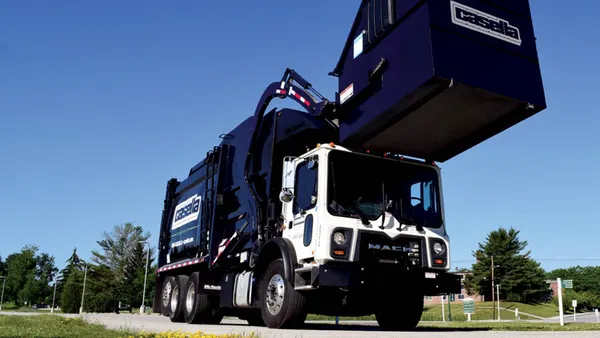UPDATE: September 19, 2019: The Washington County Solid Waste board officially approved a new recycling contract with Republic Services on Monday, as reported by The Spectrum, that expires in 2021.
The county will now pay Republic $128 per ton to process its recyclables at the company's Las Vegas MRF. The deal also requires the county to reimburse Republic for constructing a transload facility to ship the material – estimated to cost more than $114,000 – which caught some officials by surprise.
“I think it’s really unfair, and I wish we knew this six weeks ago. This could have made the difference and we could have stayed with Rocky Mountain,” said St. George Mayor Jon Pike, according to The Spectrum.
Dive Brief:
- The fate of recycling in southern Utah has been on shaky ground after the Washington County Solid Waste board declined to continue working with Rocky Mountain Recycling due to rising rates, as reported by St. George News. In response, the company canceled its contract via force majeure and stopped service in July.
- The district will now pay Republic Services $120 per ton to take its recycling to Las Vegas. Republic will handle recycling through the end of the county's contract in February 2021 while officials mull whether to continue the program.
- Republic had also hauled Page, Arizona's recyclables to Rocky Mountain's St. George MRF until the recent shift. A company representative told Page City Council members in June that tip fees had risen from $15 to $50 per ton this year, and could go up to $90. Page has since suspended its recycling program, according to Lake Powell Life.
Dive Insight:
Washington County is Rocky Mountain Recycling's only municipal customer unwilling to budge on rate increases to date, according to business development director Larry Gibbons. Others, such as the Wasatch Front Waste and Recycling District, have agreed to rate increases amid recent market changes.
The scrapped contract comes less than two years after the company opened a MRF in St. George, the county seat.
"We got totally hosed," Gibbons said in an interview with Waste Dive. "We had to let 20 people go. It's just brutal."
The county, however, has become increasingly frustrated with skyrocketing rates since it started working with Rocky Mountain in 2015, according to waste board executive chair Mike Heaton.
"We came to the point where we can't depend on them," Heaton said.
Waste board members reached their breaking point when Rocky Mountain proposed bumping rates to $78 a ton in May. The board had agreed to a $50 per ton revised rate in 2018, up from a initial cap of $15 per ton in the original contract.
When the board declined to approve another increase last spring, Rocky Mountain sent a letter in June nixing its contract via force majeure. The company argued China's scrap import restrictions had collapsed the recycling market and that the waste board was "either unwilling or unable to comprehend the reality of the situation." The letter noted communities in surrounding markets pay between $50 and $154 per ton for recycling.
The waste board briefly considered filing suit against Rocky Mountain for breach of contract during a meeting on July 1, but ultimately agreed to terminate the contract that month and made new arrangements with Republic.
Republic also offered to haul Page's recyclables to Las Vegas for the same $120 per ton rate, but the city opted instead to suspend its program. Landfill tips fees in the region are among some of the lowest in the country, making the cost difference more notable. By comparison, Washington County paid just over $16 per ton to landfill residential waste at the end of 2018.
Recycling is popular in the booming desert community – and St. George is one of the fastest-growing metro areas in the U.S. – but the county's isolated location can make recycling a challenge.
"We live in the world's worst place to recycle. It costs a fortune to get it to anywhere you can use it," Heaton said.
In the meantime, the waste district pared down the recyclable materials it will accept to limit the tonnage shipped to Nevada – now excluding mixed paper, mixed plastics and glass.
Rocky Mountain Recycling has four MRFs and about 25 municipal waste contracts in Utah. It also collects cardboard recycling from big box retailers throughout the mountain West. Gibbons said the St. George facility remains open to handle commercial material. President John Sasine is also involved in the new Crossroads Paper project slated for the Salt Lake City area.











